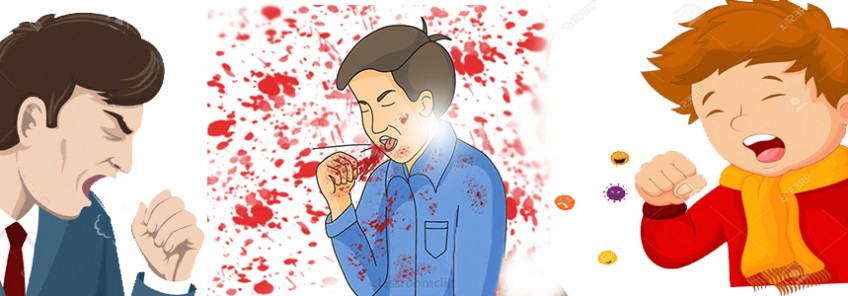Coughing up Blood

Coughing up blood can be alarming, even in small amounts. But not all hemoptysis is serious or life-threatening. The blood may be mixed with the sputum or it could be frank blood which could be bright red, dark brown or pink and frothy. When you cough up blood, most of the time it is coming from the lung and respiratory tract. Sometimes blood can originate in mouth, throat and sinuses. Occasionally, you can mistake vomiting blood with coughing up blood. It is very important to differentiate between the two.
Common Causes
Infections
- Pulmonary tuberculosis is one of the most important and common cause of coughing up blood
- Acute bronchitis (yellow/green sputum and streaky pink blood in the sputum).
- Bronchiectasis characterized by hemoptysis, recurrent cough, large amounts of bad smelling green sputum.
- Severe pneumonitis/pneumonia
- Lung abscess
- Aspergilloma/ Aspergillosis
Cancer
- Lung cancer: malignant changes in the lung’s tissue cause hemoptysis.
- Leukemia (blood cancer).
Conditions that increase Bleeding Risk
- Low platelets
- Overdose of anticoagulant (blood thinning) therapy ( warfarin, apixaban, xarelto)
- Disorders blood clotting mechanisms ( hemophilia, von Willebrand disease)
Blood clot in lungs (Pulmonary embolism)
- Pulmonary embolism (clot in lung): Pulmonary embolism is characterized by sudden sharp pain worse on breathing, swollen painful legs and hemoptysis may or may not be present.
Cardiovascular Conditions
- Pulmonary edema caused by heart failure: if hemoptysis (pink frothy sputum) is accompanied by breathlessness, frequent waking in the night, raised jugular vein and large liver.
- Valvular heart disease such as mitral stenosis also cause hemoptysis (pink fresh blood with no sputum).
- Aortic aneurysm
Autoimmune Diseases
- Vasculitis (inflammation of blood vessels) of the blood vessels (arteries or veins) of the lungs.
- Systemic lupus erythematosus (autoimmune disease which affects the brain, joints, kidney, lungs, skin and other organs).
Foreign Body/Trauma
- Foreign body or food content aspiration can also cause the hemoptysis.
- Trauma to the chest also leads to hemoptysis.
- Following diagnostic procedure like bronchoscopy
Hereditary Conditions
- Cystic fibrosis (hereditary disorders which causes serious damage to lungs and gastrointestinal system).
- Blood disorders: hemophilia (deficiency of clotting factor)
When to visit the Doctor
Seek medical help coughing up blood is accompanied by:
- Chest pain
- Difficulty in breathing or shortness of breath during usual day to day activities.
- Consistent rise in body temperature (fever) in evening time for more than 3 weeks
- Swollen painful legs
- Sudden sharp pain worse on breathing.
- Presence of blood in stool and urine
- Dizziness or lightheadedness (feeling of weakness or feeling of getting faint).
- Night sweats
- Weight loss
- Recent history of accident and trauma.
- Coughing up blood for more than a week.
Diagnosis
Cough is symptoms of underlying illness which can be serious. Diagnosis is made by:
- History and Physical examination by Physician, and one or more of the following tests
- Blood and sputum test
- Chest X ray
- CT scan of Chest
- Arterial blood gas
- Bronchoscopy
Treatment
Treatment depends on the cause of hemoptysis:
- Immediate oxygen therapy should be started in the conditions of breathing difficulty. Bronchodilators are also provided according to the conditions.
- Pulmonary tuberculosis is treated with DOTS (directly observed treatment short course) method. Commonly using drugs are rifampicin, isoniazid, ethambutol, pyrazinamide.
- Antibiotics are prescribed for respiratory tract infections such as pneumonia, bronchitis and other infections.
- Person diagnosed with lung cancer and blood cancer (leukemia) is treated with chemotherapy and other treatment methods for cancer.
- Corticosteroids medicines are provided for autoimmune conditions such as vasculitis, systemic lupus erythematosus etc.
- Foreign body in the respiratory tract should be removed if present.
- Coughing up blood caused by cystic fibrosis is treated with antibiotic and bronchodilators.
- Blood thinning drugs (anticoagulant) such as warfarin should be stopped to prevent further bleeding inside the respiratory tract.
- Hemoptysis associated with hemophilia is treated with intravenous administration of clotting factor VIII for hemophilia A and clotting factor IX for hemophilia B.



Send us your feedback on this article